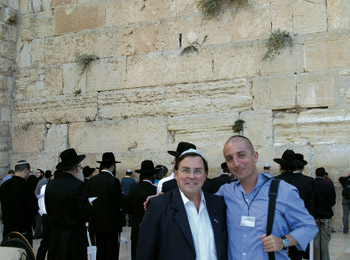MONTREAL — Université de Montréal rector Guy Breton says he learned more in Israel than he did during a similar academic mission to China.
The superpower is eclipsed by the tiny Jewish state, in his view, when it comes to the dynamism of its universities.
When Breton became rector in 2010 he vowed to expand the UdeM’s already extensive ties with hundreds of academic institutions around the world. Three countries were in his sights: China, Brazil – as the economic leader of Latin America – and Israel.
In October, he led an intensive 10-day trip to Israel, the first UdeM mission to the country, visiting all seven major universities. The 10 delegates included vice-rector for international relations Hélène David and professors and researchers from departments as diverse as pharmacy, biology, political science, music and medicine. Breton is a former vice-dean of medicine.
Breton said he received no opposition to making Israel a priority, but plenty of questions as to why. Today, he feels vindicated.
“It was an incredible eye-opener,” he said of the mission. “We have a folkloric image of Israel. If you are not close to it, you do not understand the reality. Much more is going on there than we think.”
Breton makes clear he is not interested in entering into political disputes, and has no patience with boycotts. His first job is to educate people, and he is convinced a greater connection with Israel will help him do that.
“I want students to be better trained. Period. Don’t bother me with politics,” he said.
When he speaks of dynamism, Breton means Israeli academics’ ability to “think outside the box; they try to find a solution to a problem, that not only is good for Israel, but could be exportable, that could help others.
“This is what we should be doing everywhere.”
Breton was impressed with the universities’ technology transfer companies, which seek markets for products and ideas coming out of research.
Israel is far ahead of Canadian universities in this regard, he said. He terms it “snobbish” to rigidly hold to the view that the academic and the commercial should not mix.
“If a I find a good molecule, a better way to teach math, why shouldn’t it be made available to society?” Breton wonders.
That does not mean industry should direct what research a university conducts, he added, acknowledging the legitimate concern that research that doesn’t lead to the marketplace may be shunned if universities get too cozy with business.
As long as the direction comes from the university, and not the company, this fear is exaggerated, he believes.
The UdeM is the second largest university in Canada in terms of enrolment, and its annual research budget of $525 million is surpassed only by the University of Toronto and University of British Columbia.
The UdeM visitors learned that Israeli universities are not “swimming in money” from donations from Jewish communities abroad as they had perceived.
The revenue from commercialization is a significant source of revenue, Breton found out, something cash-strapped universities here could use.
Breton stressed that the UdeM, which was founded 135 years ago to educate the French-Canadian elite, has throughout its history been open to everyone. There were never quotas on Jewish students as there were, notably, at McGill University, and many Jews were able to enter the professions because they were admitted by the UdeM.
One of Breton’s pet projects today is to find a way to persuade chassidic Jews – his neighbours in Outremont – to study at the UdeM.
“We have a long, long history of positive relations with the Jewish community,” said Breton, but he felt that contact had been allowed to lapse in recent years. Therefore, he more than welcomed the Centre for Israel and Jewish Affairs’ offer to help organize the Israel mission.
He was also glad that Rosalind and Morris Goodman, who graduated in pharmacy from the UdeM 60 years ago and is a major benefactor of his alma mater, accompanied the group, providing them with an insider’s perspective on life in Israel.
The UdeM had some earlier connections to Israeli universities, notably Hebrew University of Jerusalem, but they had never been formalized. Now, memorandums of general agreement have been reached with Technion and the University of Haifa, and there are discussions for collaboration with the five other universities.
The delegation made a brief visit to Ramallah on the West Bank, at the suggestion of their CIJA escort Myriam Azogui-Halbwax. Because there was a university strike, the Montrealers met with two representatives of Birzeit and Al-Quds universities at the Canadian delegation, rather than on campus.
Breton found they were not at the level of the Israeli universities, and no future partnership is envisioned, although the UdeM may help them, perhaps in the field of medicine.
Personally, Breton said he found the trip emotional; although not “a religious fanatic,” it was moving to walk in the footsteps of Jesus Christ.
He was also gratified to see how peacefully, Jews, Muslims and the various Christian denominations live together in Jerusalem.
Breton was impressed with how much Israel has accomplished in its 65-year history, and its “capacity to change.”
“The Israel of 2013 is not the Israel of 1993 or even 2003,” he said.
Israeli university students, compared to their Quebec counterparts, are more mature – in years because of their military service – but also in outlook.
“They do not want to waste time. They are keen to learn well and fast, and to have a good life.”
One of the first fruits of the new relationship will be a concert organized by the music faculties of UdeM and Tel Aviv University next fall in Montreal. It will be conducted by the Israeli Yoav Talmi, who was artistic director of the Orchestre symphonique de Québec from 1998-2011 and is now music director of the Israel Chamber Orchestra.
